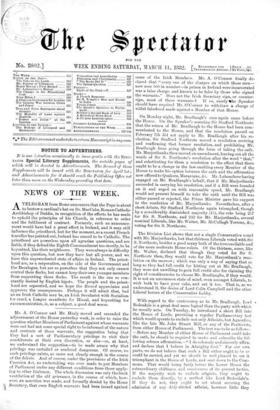Mr. A. O'Connor and Mr. Healy moved and seconded the
adjournment of the House yesterday week, in order to raise the question whether Members of Parliament against whom warrants were out had not some special right to be informed of the nature and contents of those warrants, the suggestion being that they had a sort of Parliamentary privilege to visit their constituents at their own discretion, or else—so, at least, we understand the suggestion—to be made aware why that privilege was curtailed or rendered dangerous. Of course, no such privilege exists, as came out clearly enough in the course of the debate. And of course, under the provisions of the Irish Coercion Act, no undertaking was ever made to put Members of Parliament under any different conditions from those apply- ing to other Irishmen. The whole discussion was only the fresh ventilation of the old grievance, in the course of which, how- ever, an assertion was made, and formally denied by the Home Secretary, that even English warrants had been issued against some of the Irish Members. Mr. A. O'Connor finally de- clared that "every one of the charges on which those men— now over 500 in number—in prison in Ireland were incarcerated was a false charge, and known to be false by those who signed the warrants." Does not the Irish Secretary sign, or counter- sign, most of these warrants ? If so, surely the Speaker should have required Mr. O'Connor to withdraw a charge of wilful falsehood made against a Member of that House.


































